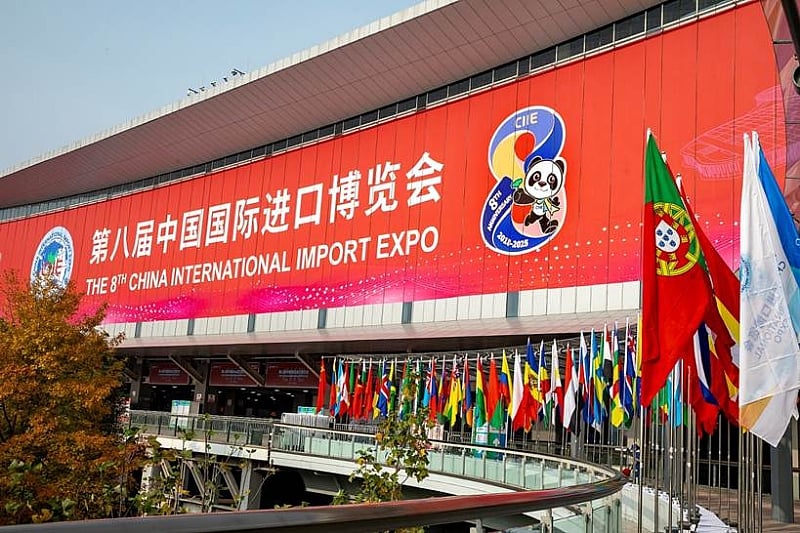From Qin Mei
On October 28, a shipment of exhibits arrived at Shanghai. The cargo, weighing 4.7 tonnes in total, included South African wine, tea, and dried fruits. To ensure the swift entry of these imported products that have traveled from afar, Shanghai Customs implemented an exclusive service for the 8th China International Import Expo (CIIE). By adopting a series of trade-facilitating measures, they have significantly enhanced customs clearance efficiency. These products, poised for their debut at this year’s CIIE, are expected to enter the Chinese consumer market shortly thereafter, using the expo as their gateway.
Opportunity
Since its inauguration in 2018, the expo serves to expand China’s opening-up and transform its vast market into global opportunities.
China’s immense market, with over 1.4 billion people, including more than 400 million middle-income earners, offers a diversified market space ripe with potential. As Chinese consumers continue to pursue a higher quality of life, China has actively expanded imports, sharing development opportunities globally. It has remained its position as the world’s second-largest import market for 16 consecutive years. Bolstered by this mega-market, the previous seven editions of the CIIE generated more than US$500 billion in intended deals, making the expo a key window for China’s opening-up and a premier platform for global economic cooperation.
The 8th CIIE is scheduled to take place from November 5 to 10, attracting 4,108 overseas exhibitors from 155 countries, regions, and international organizations to a space exceeding 430,000 square meters. African participation has grown notably, with 17 countries set to join the Country Exhibition and an 80% year-on-year increase in the number of participating businesses. Signature African products, from Nigerian soybeans and Beninese pineapples to Burundian coffee, will be showcased together—a clear testament to the strong appeal of the Chinese market.
Tangible outcomes tell the most compelling story. For example, Nigerian cashews, once a product largely unknown to Chinese consumers, now enjoy soaring demand thanks to the CIIE platform. Since Rwandan dried chili peppers entered the Chinese market in 2021, chili farming has become an important export industry, benefiting thousands of local farmers. More recently, in 2024, African specialties such as Zambian honey, Kenyan flowers, and Beninese pineapples emerged as popular products at the expo.
Sharing
This year, the CIIE will expand its dedicated zone for African products and launch a cross-border e-commerce showcase platform, extending support from offline exhibitions to online promotion.
China’s commitment to expanding market access for African countries is ongoing. Starting December 1, 2024, China has granted zero-tariff treatment on 100% of tariff lines to all least developed countries (LDCs) with which it has diplomatic relations, including 33 African nations.
In July 2025, 38.4 tonnes of Burundian Arabica coffee beans were successfully shipped directly to China for the first time under the zero-tariff policy, marking Burundi’s first direct export of raw coffee to the Chinese market. Subsequently, enterprises from both sides signed contracts for over 900 tonnes and US$5 million, providing a significant boost to Burundi’s agricultural exports and economic growth.
According to China’s Ministry of Commerce, from the launch of the zero-tariff initiative to this March, China’s imports from African LDCs reached US$21.42 billion, a 15.2% year-on-year increase. This demonstrates the continued remarkable success of China-Africa trade.
Partnership
China and Africa share a profound and enduring relationship, characterized by friendship, partnership, and shared aspirations.
Hassan Mohammed, the trade commissioner of the Trade Office of the Consulate General of Nigeria in Shanghai, has attended every session of the CIIE. He recalled that at the 7th CIIE, 13 of the 16 participating Nigerian companies successfully secured business agreements, including a notable $1.2 million contract for cocoa beans.
Mohammed believes the CIIE has paved a road to commercial success for Nigerian businesses. He highlighted that through joint ventures with Chinese partners, Nigerian companies are now able to scale production, leading to the creation of more jobs in Nigeria and increase incomes for the Nigerian people.
In 2024, China-Africa trade surged to $295.6 billion, a robust 4.8% year-on-year increase. For an impressive 16 consecutive years, China has maintained its position as Africa’s largest trading partner and has become the continent’s second-largest importer of agricultural products.
An African proverb wisely states, “If you want to go fast, go alone. If you want to go far, go together.” The CIIE, in turn, serves as a vivid embodiment of this sentiment, showcasing how China and Africa are effectively transforming market opportunities into shared development.
The expo’s impact extends far beyond boosting trade in products like coffee, cashews, and fresh flowers. It empowers African enterprises to expand production, create new job opportunities, and gain direct access to China’s vast consumer market.
By walking forward together, China and Africa are not just going farther—they are opening broader markets, unlocking unprecedented growth potential, and forging a shared future, hand in hand. –The Author is also a Reporter for CGTN Radio





